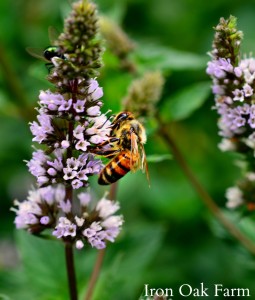 Bees are amazing! It’s strange to think that I have a relationship with an insect, but truly I do. And not just one insect, but thousands! A whole insect family! When I’m out in the yard, pulling weeds in the garden and I see a honey bee, my heart smiles. “That’s one of our bees” I think to myself. It’s a relationship in much the same way that I say hello to one of our free range hens, should she wander over for a cluck or two.
Bees are amazing! It’s strange to think that I have a relationship with an insect, but truly I do. And not just one insect, but thousands! A whole insect family! When I’m out in the yard, pulling weeds in the garden and I see a honey bee, my heart smiles. “That’s one of our bees” I think to myself. It’s a relationship in much the same way that I say hello to one of our free range hens, should she wander over for a cluck or two.
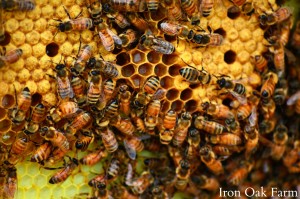 It really puts a more mindful take on living creatures big and small. I often see the activist photos that compare a piglet to a puppy. The sign often says something to the effect of “Why love one, but eat the other.” While I’m not a vegetarian, I can appreciate the meaning of the comparison in the message. Being a meat eater, and someone who is compassionate about the well being of animals is something I struggle with and have for years. For now, I take comfort in the fact that the animals we keep are well cared for and happy up until the day they pass. It’s not a perfect solution, but for now, it’s the best we can do.
It really puts a more mindful take on living creatures big and small. I often see the activist photos that compare a piglet to a puppy. The sign often says something to the effect of “Why love one, but eat the other.” While I’m not a vegetarian, I can appreciate the meaning of the comparison in the message. Being a meat eater, and someone who is compassionate about the well being of animals is something I struggle with and have for years. For now, I take comfort in the fact that the animals we keep are well cared for and happy up until the day they pass. It’s not a perfect solution, but for now, it’s the best we can do.
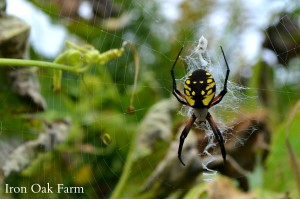 Keeping bees has opened my eyes to other natural relationships between humans and small creatures. I’ve never been one to smash a spider under my shoe heel. I prefer to slip a cup over it and let it go outside where it can help control pest insects that destroy my garden. But since we’ve begun a relationship with bees, it’s made me even more aware of how I treat all living things.
Keeping bees has opened my eyes to other natural relationships between humans and small creatures. I’ve never been one to smash a spider under my shoe heel. I prefer to slip a cup over it and let it go outside where it can help control pest insects that destroy my garden. But since we’ve begun a relationship with bees, it’s made me even more aware of how I treat all living things.
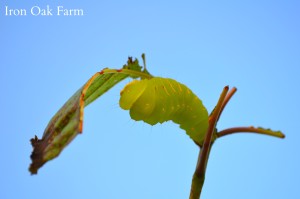 I can’t help but marvel at the size and color of a tomato hornworm,
I can’t help but marvel at the size and color of a tomato hornworm,
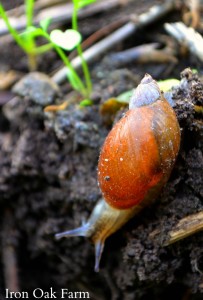 or the beautiful shell that a garden snail carries on its back. And I know all about the damage they do. But like us, they’re just trying to survive. They don’t understand that the tomato plants belong to us.
or the beautiful shell that a garden snail carries on its back. And I know all about the damage they do. But like us, they’re just trying to survive. They don’t understand that the tomato plants belong to us.
Now, I’m not saying that I don’t swat a mosquito when it lands on my arm, or a black fly looking to take a chunk out of my head, I’m just saying that it’s made me more aware of the relationship these creatures play in our lives. Good and bad. With awareness comes knowledge and knowledge will hopefully lead to a less destructive and natural way of hormonal living.
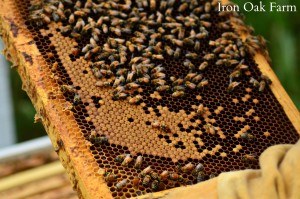 We’ve never used pesticides in our yard or in our garden…I’m just not into senseless, absolute and non-discriminatory killing of all things insect…call me crazy! I’m not really sure why it took scientists so long to figure out why all the bees are dying when they are spraying insect killers on acres and acres of plants. Bees are insects too.
We’ve never used pesticides in our yard or in our garden…I’m just not into senseless, absolute and non-discriminatory killing of all things insect…call me crazy! I’m not really sure why it took scientists so long to figure out why all the bees are dying when they are spraying insect killers on acres and acres of plants. Bees are insects too.
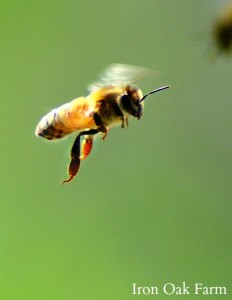 I also believe that these insecticides can’t be good for human consumption either. So by being actively supportive of bees, perhaps some of these terrible chemicals will also cease to be a part of our food system.
I also believe that these insecticides can’t be good for human consumption either. So by being actively supportive of bees, perhaps some of these terrible chemicals will also cease to be a part of our food system.
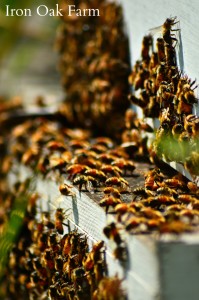 Food is relative. As is species superiority. We might be larger than an insect, more powerful, stronger and more intelligent in coming up ways to destroy. We create pesticides, herbicides and chemical fertilizers, genetically modify our food and treat the animals meant for consumption with little respect. But nature as a whole is smarter. And now with the bee crisis, much of our food supply is threatened by the lack of pollinators
Food is relative. As is species superiority. We might be larger than an insect, more powerful, stronger and more intelligent in coming up ways to destroy. We create pesticides, herbicides and chemical fertilizers, genetically modify our food and treat the animals meant for consumption with little respect. But nature as a whole is smarter. And now with the bee crisis, much of our food supply is threatened by the lack of pollinators
So what has our so-called superiority done for us?
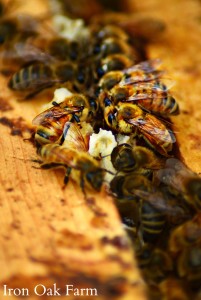 With intelligence comes responsibility and if ethics aren’t enough to get you there, then perhaps the threat of never drinking coffee or eating chocolate is.
With intelligence comes responsibility and if ethics aren’t enough to get you there, then perhaps the threat of never drinking coffee or eating chocolate is.
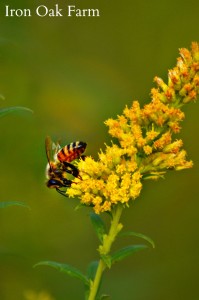 Over the years, beekeeping has perhaps changed from its simplistic state of being a source for sweet, delicious honey. Is it too far to say that keeping a bee hive might be considered a humanitarian effort? We’re not just saving a species because we enjoy variety and harmony in our natural landscape; we’re saving a species that we depend on for much of our diet, and the farmers livelihood who depend on the crops that bees pollinate for an income.
Over the years, beekeeping has perhaps changed from its simplistic state of being a source for sweet, delicious honey. Is it too far to say that keeping a bee hive might be considered a humanitarian effort? We’re not just saving a species because we enjoy variety and harmony in our natural landscape; we’re saving a species that we depend on for much of our diet, and the farmers livelihood who depend on the crops that bees pollinate for an income.
So in the end, keep bees if you can. It’s one of the most rewarding hobbies I’ve ever participated and I encourage you all to do the same, and share and encourage others to follow you.










7 Comments
Excellent blog post, Jennifer. You put my own thoughts into words beautifully.
hallo im after a lil legal advise if anyone can help im in NSW and just starting to enjoy the fun of bees . im being steered by a professional , now what i am asking and need to know is , is there a spacific distance or anything that i need to keep my hives from the neighbour . hes being Stupid as he usually is and says he will spray his mango tree with a poison to kill ANY insects that get on it . stupid as bees polinate hes worried his lil brat grandaughter MAY get stung . the hives are on the other side of my yard for him anyways . just curious on the NSW bee keeping laws . hope someone can advise me . Thanking U stephen
Inform your neighbor that, while the tree is mostly self fertile, bees will increase the fruit production, and he might as well remove the mango tree, as why bother having it if he doesn’t Want more mangoes(?). Research showed that 50 different insects, including your native bees, flies, and honey bees, come into contact with the reproductive parts of the flowers. Inquire as to how he’s going to So selective of the pollinators, and if he sprays poison on his tree, the poison will become part of the fruit, build up over time inside his precious granddaughter, and cause health problems down the road. You could tell him that if his granddaughter talks to the bees while she is playing in the yard near the tree, that the bees might bonk her, that as long as she doesn’t try to pick up the bees, most likely the bees won’t hurt her, unless they are trying to tell her something is wrong with her health, and may sacrifice themselves to point out or try to heal her. Maybe introduce her to a honey bee drone(no stinger). Provide some info about apitherapy, to back up the healing angle. I have a neighbor that was kinda freaking out in conversation, when I mentioned that I’d be raising bees, but even when our fence was down(windstorm damaged, fixed now) and the hive was occupied & visible, never was there any hue & cry raised. What most people don’t know, is swarms are mostly quite calm while looking for a new place to set up hive. Just the bulk of a swarm and possibility of Africanized bees, is frightening. I’ve only read of that problem in the Western hemisphere(Africanized bees). Hope this helps.
we beekeepers have a saying: If your neighbor has a problem with your bees….you had a problem with your neighbor before you got your bees….
Thank you, Jennifer, for your post! I agree with every word you said!
Sorry for you, Stephen. That sounds horrible. A beekeeper friend of mine had a neighbour who also hated every insect with a stinger. Once a swarm settled down on one of his trees. Instead of informing my friend he burnt the bees…..My friend was so upset, so sad and madly angry that he instantly decided to move away. He actually sold his property and now happily lives on a danish island. Since the bees visit plants all over and all around your home, they will surely also visit your neighbours mango tree. Maybe staying really friendly and calm and offering scientific knowledge about poisons – also the effect on human beings – ,the character of bees, the difference between bees and wasps……can help. I hope your neighbour will change his mind soon! I wish you all the best, Jennifer and Stephen! Sonja
Animals and insects obey their Creator, while man is inclined to disobey his Creator and do the bidding of the Father of Lies.
Years ago I read a story of a similar problem with a neighbor. The answer then had to do with the fact that putting up a barrier–like a sheet–between the two properties trained the bees to go over the top of the barrier–higher than the neighbor was tall. After several days of flying weather–the sheet was removed but the bees continued to follow the same flight path. For the entire year!! I know this doesn’t keep the bees from being poisoned when visiting the neighbor’s tree.
Good luck.